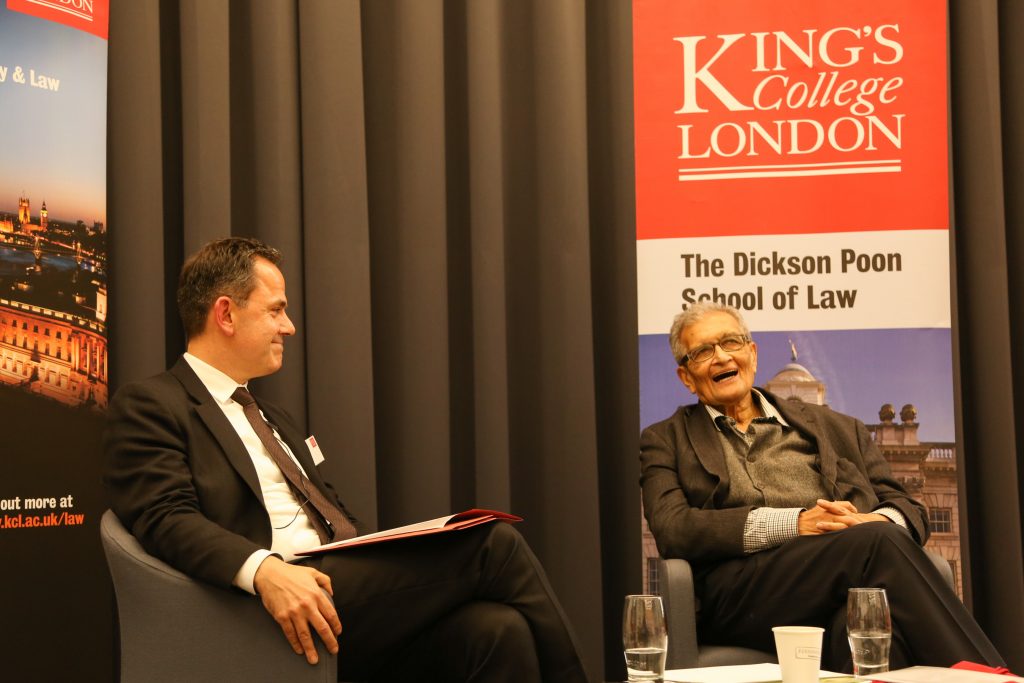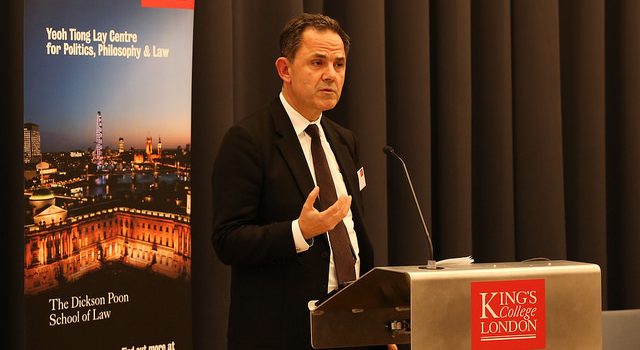The concept of minimum core obligations says there are social, economic, and cultural rights that every country can put in place immediately. So why are they so controversial?
“What I really want to do,” John Tasioulas tells me, “is rehabilitate this idea of minimum core obligations.”
John Tasioulas is a moral and legal philosopher and Director of the Yeoh Tiong Lay Centre for Politics, Philosophy, and Law. He’s recently produced two reports for the World Bank on minimum core obligations. Minimum core obligations, he explains, relate to the International Covenant on Economic, Social and Cultural Rights (ICESCR) rather than the International Covenant on Civil and Political Rights (ICCPR).
The ICESCR covers rights that are often heavily dependent on a country’s resources, like health and education. One of the issues when it comes to implementing these rights is the different levels of wealth across the globe. Rather than penalising poorer countries for providing fewer services, these rights are subject to the doctrine of progressive realisation. This means that states are expected to put more rights in place as their economies improve.
The concept of minimum core obligations proposes that there’s a set of social, cultural, and economic rights that all states can implement immediately, regardless of wealth. The idea has sparked controversy, ranging from accusations that it will discourage wealthy states from putting additional rights in place, to questions about its basic feasibility.
John Tasioulas tells me why he believes it’s possible to create a set of minimum core obligations and what makes them so important.

Image Credit: Dominic Turner / Kings College London
What are Minimum Core Obligations in relation to human rights?
“That was hugely contested, to the point where some people said, ‘it’s too vague, it’s a useless concept, let’s get rid of it.’ I came to the conclusion that, quite the contrary, it’s a vital concept. The way I would put it is like this: minimum core obligations arise with respect to economic, social, and cultural rights. So the right to work, the right to health, the right to an adequate standard of living, etc.
“Now, one question you could ask about those rights is what’s the time-frame for fulfilling those obligations, as opposed to civil and political rights? The answer has been, while they’re subject to a doctrine of progressive realisation, you don’t have to fulfil them immediately. But you must be taking reasonable steps in light of your limited resources to fulfil them over time. So that’s a kind of general answer to the timetable question.
So although the right to food may be realised progressively over time, maybe one of the obligations under the right to food, the right not to be hungry, has to be immediately realised.
John Tasioulas
“But minimum core obligations introduce a qualification to that. They say while it’s generally true in principle that a country can progressively realise social, economic, and cultural rights, maybe there’s a subset of obligations that all countries must fulfil immediately. So although the right to food may be realised progressively over time, maybe one of the obligations under the right to food, the right not to be hungry, has to be immediately realised.
“One of the things that I think is important here is that a lot of people denigrate human rights by saying, ‘well, you’ve got all these rights and obligations and no state can fulfil these obligations because of limited resources. So basically, human rights don’t mean much because, in the end, the state can just pick and choose which obligations it fulfils.’
“Minimum core obligations offer a response. They say, in the case where there are limited resources and all obligations cannot be fulfilled, you must distinguish between minimum core obligations, which are immediate demands, and non-core obligations, which are still obligations, but which are subject to being progressively realized over time. So it addresses this prioritisation problem which many people have said human rights is not competent to address.”

Image Credit: Dominic Turner / Kings College London
How do you determine the content of those rights? That must be hugely contentious?
“First of all, presumably, you’ve determined the content of the right generally. Then you’ve got to ask, within those obligations that you’ve determined, which are the ones that it is feasible to say can be fulfilled immediately by all states? And so it requires real difficulty assessments in terms of the costs of making this an immediate demand.
It could be that it’s just totally infeasible for the vast majority of states to make the provision of high quality food an immediate obligation. But an entirely different picture emerges if you ask, is the avoidance of hunger something that could be an immediate obligation? Is that infeasible also? I think the answer there is that you’re more likely to say that’s more realistic as an immediate obligation rather than something that’s much more demanding in terms of resources.”
So which rights are Minimum Core human rights?
“I actually tried to avoid talking about which ones they were! There are two problems with giving a list. One is it assumes a certain kind of god-like knowledge on my part, that I can just range across and tell you what the minimum core obligations are. I don’t think I have that knowledge, I think what I’m saying is: here is a framework, here are the considerations we need to take into account and now we need to go through this process and, ideally, we need to go through this process in a way that engages lots of voices and perspectives. So that was one reason, I didn’t want to claim to knowledge I didn’t have.
What I really want to do is rehabilitate this idea of minimum core obligations, to show that it fulfils an important function in priority setting.
John Tasioulas
The second reason was more political, I thought what I really want to do is rehabilitate this idea of minimum core obligations, to show that it fulfils an important function in priority setting. But if I then went ahead and identified them there was a risk of distracting people. Then the debate would be, oh do you agree with my particular list of minimum core obligations, rather than the more general point that I wanted to make: it’s a very important concept, these are very important norms and there is a way of engaging in a rational discussion about them. So I purposefully left that open.”
Why do Minimum Core Obligations need rehabilitation?
“Because some of the leading literature is very sceptical about them. The literature will say things like: there is no meaningful concept here so just get rid of it. Others might say something like, there’s a meaningful idea but actually it’s a dangerous idea. Why? Because developing countries will just focus on core obligations and they’ll treat non-core obligations as unimportant. Now that’s based on people misreading the doctrine but nonetheless it’s relevant.
“So I tried to say something about both of those sorts of scepticisms. To say that there is some way we could rationally structure arguments for identifying these core obligations and, that although there is a danger of side-lining everything else, the answer to that is to educate people about what core obligations are. So that when someone says, well, that’s a non-core obligation, it doesn’t follow that it’s not an obligation or that it’s not important.”
Is there a danger that wealthier countries might use Minimum Core Obligations to avoid further provisions of care?
“One of the important things I say in the report is that minimum core obligations are not only a floor, they’re a universal floor. They’re the minimum that all states should comply with. But if you’re a rich country you may have to immediately comply with more than the minimum core. The reason for that is the doctrine of progressive realisation doesn’t say you can take your time fulfilling rights, it says, you can take steps over time if you have resource constraints. If you’re a super-rich country you don’t have the resource constraints, so the progressive realisation doctrine won’t apply in that sense.”

Image Credit: Dominic Turner / Kings College London
You mention that you think the international community is still at an early stage in terms of articulating minimum core healthcare obligations for states. Where would you like the conversation to go in the future?
“I think we’re still actually in an early stage in thinking seriously about human rights. One thought that I want to resist is the tendency of people to talk about human rights when they’re really just talking about an interest that someone has, even a very powerful interest. It’s not enough simply to talk about interests, my interest in health is not the same as my right to health. My right to health relates to which of my interests in health, for example, impose obligations on others. So we need to have that emphasis on obligations. I think this would create a lot of much-needed discipline if we could move the debate in that particular way.
I would like to see a greater emphasis on thinking about rights as rights, rather than simply interests people have.
John Tasioulas
“That’s one thing I would like to see, a greater emphasis on thinking about rights as rights, rather than simply interests people have. If they’re simply interests then they’re all over the place and they lack the moral force of saying ‘well, there’s an obligation.’ I think part of the importance of human rights is that they are one kind of consideration among others. And if you try to shoehorn everything under the rubric of human rights, you end up undermining human rights themselves.”







